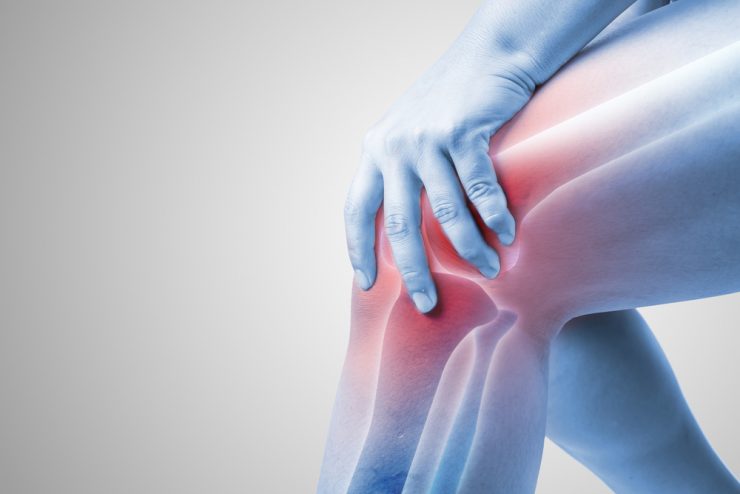As the weather starts to cool many of us find our joints start to ache.
Sadly there is no cure for arthritis but there is plenty you can do naturally to ease the pain and increase mobility says Editor Jane Garton.
Knees that creak and aching joints could be the familiar symptoms of arthritis or the first signs that something could be wrong. If you think arthritis could be your problem you are not alone. Around 8.5 million people are thought to suffer in the UK, especially in the 45 plus age group. The secret is not to ignore symptoms, as research now shows that the sooner you take protective action the less severe your symptoms are likely to be. Keeping active, eating healthily and watching your weight may all help. There are also some supplements and herbs worth considering.
TWEAK YOUR DIET
There are no dietary quick fixes for arthritis but eating the right foods can help to ease symptoms. A healthy Mediterranean diet, which includes plenty of fresh fruit and vegetables, whole grains, low-fat dairy products and lean protein such as fish and pulses plus olive oil and a regular splash of red wine, is the one to aim for. It’s also a good idea to reduce your portion size. Vegetables should make up the biggest portion on your plate.
Go easy on foods containing saturated animal fat such as red and processed meats, full-fat dairy foods and steer clear of sugary and fatty foods such as cakes, biscuits and pastries. Some experts also recommend cutting out foods from the nightshade family, such as potatoes, aubergines and tomatoes, although the research evidence for this is slight.
KEEP MOVING
When it comes to joint health a common sense approach to exercise is key, say the experts. This means combining muscular strength work to increase joint stability and stretching exercises to maintain mobility. Aim for a structured, progressive plan – two to three sessions per week of exercises that target the whole body with resistance work using rubber bands or dumbbells.
Basic multi-joint exercises are best, for example squats, lunges, press-ups, and shoulder presses. Stretches should include all the major muscle groups – a yoga class is ideal. Try to avoid high impact cardio, which can put further stress on your joints, and invest in footwear that provides good stability and cushioning.
SUPPLEMENT IT
“Omega 3 fish oils help to damp down inflammation, while glucosamine is needed for cartilage repair and to make the synovial fluid within joints for cushioning,” says Dr Sarah Brewer. New research suggests that glucosamine also has an anti-inflammatory action that suppresses the breakdown of cartilage.
Chondroitin is needed to form ‘springy’ molecules that increase the strength and elasticity of cartilage, making it more resilient. It also inhibits the enzymes responsible for breaking down cartilage and stimulates the synthesis of type 2 collagen making it the ideal partner for glucosamine. Other joint-friendly supplements include vitamin C, needed to make collagen, and vitamin D, which appears to increase the thickness of joint cartilage.
GO HERBAL
Looking inside the herbal medicine chest, devil’s claw, bromelain, ginger and rose hip all have analgesic and anti-inflammatory effects, which may help reduce joint pain and swelling.
In a study, people with osteoarthritis of the knee and hip reported less pain after eight weeks of taking an extract of the South African plant devils claw, which contains compounds with natural anti-inflammatory and painkilling properties. Like non-steroidal anti-inflammatory drugs, they appear to regulate the activity of enzymes involved in the inflammatory process, helping to reduce joint stiffness and pain.
Meanwhile, bromelain, an extract from the stem of the pineapple plant, has been shown to contain anti-inflammatory chemicals and is thought to help reduce the inflammatory response. This in turn alleviates pressure in the joints making moving around easier.
Long valued for its vitamin C content, rose hip is now being used with some success to help reduce the pain of arthritis. And last but not least, ginger has a warming effect on the body, helping to boost circulation and ease inflamed joints and rheumatic pains. Include it in your cooking or make yourself a ginger tea. Simply add half a teaspoon of grated ginger root to a cup of very hot water. For extra zing add a pinch of cinnamon or a squeeze of fresh lemon juice.
TRY THESE TIPS:
Lose weight if you need to
Shedding just a few pounds helps reduce stress on the joints and can be as effective at relieving arthritic knee pain as taking painkillers.
Try to stay positive
Sharing experiences with others in the same boat can be helpful so think about joining a local arthritis care group.
Drink up
Water helps lubricate the joints so aim for at least six to eight glasses a day.
Avoid stress
Make time for relaxation and ensure you get enough sleep.
























We would always recommend talking to your healthcare professional, GP or otherwise, if you are on any other medication before starting to take any herbal medicines.
Thanks for sharing useful information.
Is it okay to use herbs along with conventional medications?
Thanks! This is really useful advice!
It’s awesome designed for me to have a website, which is good designed for my knowledge.
thanks admin https://tealfarmsketo.org/
Hello to all, the contents existing at this site are truly remarkable for people knowledge, well,
keep up the good work fellows. https://slimessentials.net/
Great post, you have pointed out some good details, I likewise think this
is a very great website. http://bradfordfadden.wapamp.com/index/__xtblog_entry/12063602-your-sciatic-nerve-pain-is-mental-passivity?__xtblog_block_id=1